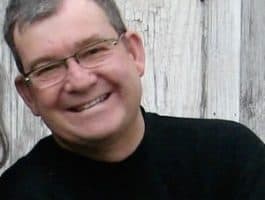
Responding to the Cry of the Orphan
Is the Church doing anything to help the world’s 143 million orphans? Today’s broadcast features pastor Bob Coy of Calvary Chapel in Orlando, Fla. discussing his commitment to justice and compassion for suffering orphans, and his biblical model of compassionate activism and how it works, straight from God’s own Word.
Show Notes
About the Host
About the Guest
-
Is the Church doing anything to help the world’s 143 million orphans? Today’s broadcast features pastor Bob Coy of Calvary Chapel in Orlando, Fla. discussing his commitment to justice and compassion for suffering orphans, and his biblical model of compassionate activism and how it works, straight from God’s own Word.
-
Dave and Ann Wilson
Dave and Ann Wilson are hosts of FamilyLife Today®, FamilyLife’s nationally-syndicated radio program. Dave and Ann have been married for more than 38 years and have spent the last 33 teaching and mentoring couples and parents across the country. They have been featured speakers at FamilyLife’s Weekend to Remember® marriage getaway since 1993 and have also hosted their own marriage conferences across the country. Cofounders of Kensington Church—a national, multicampus church that hosts more than 14,000 visitors every weekend—the Wilsons are the creative force behind DVD teaching series Rock Your Marriage and The Survival Guide To Parenting, as well as authors of the recently released book Vertical Marriage (Zondervan, 2019). Dave is a graduate of the International School of Theology, where he received a Master of Divinity degree. A Ball State University Hall of Fame quarterback, Dave served the Detroit Lions as chaplain for 33 years. Ann attended the University of Kentucky. She has been active alongside Dave in ministry as a speaker, writer, small-group leader, and mentor to countless wives of professional athletes. The Wilsons live in the Detroit area. They have three grown sons, CJ, Austin, and Cody, three daughters-in-law, and a growing number of grandchildren.
-

Paul Pennington
Paul is the Executive Director of Hope for Orphans and his wife, Robin, is Director of Family Relations. Paul and Robin co-founded Hope for Orphans in 2002, before merging with FamilyLife in 2003. Paul is the co-author of the book "Launching An Orphans Ministry in Your Church" and a co-host of the "If You Were Mine DVD Adoption Workshop" both published by FamilyLife Publishing. Paul also led the development of the "Your Church and the Orphan Seminar" that helps churches launch an orphan minis...more
Is the Church doing anything to help the world’s 143 million orphans?
Bob Lepine: James 1:27 says that "pure and undefiled religion is visiting the widow and the orphan in their need." Pastor Bob Coy says we need to understand what the Bible has in mind when it talks about visiting orphans.
Bob Lepine: Now, at first, I know the word "visit," you know what it sounds like? "Let's stop by and see orphans, Jesus asked us to stop and see some orphans. Okay, where are the orphans at? Oh, they're down the block and around the corner, a little further back, okay, there they are – 'Hi, orphan boys; hi, orphan girls, we're visiting, bye-bye.' Okay, wash your hands, use the antiseptic, you saw the orphan kids, it's time to go."
No! The word for "visit" – would you circle that? "Inspect," "select." Spend time, examine, spend some time with these kids, man! Visit their little hearts.
Bob Lepine: This is FamilyLife Today for Thursday, November 20th. Our host is the president of FamilyLife, Dennis Rainey, and I'm Bob Lepine. Have we done what the Scriptures are asking us to do? Have we visited orphans in their need? We'll talk about that today. Stay tuned.
And welcome to FamilyLife Today, thanks for joining us on the Thursday edition. Our listeners have heard us regularly saying …
Dennis: On our soapboxes.
Bob Lepine: Does God want you to do something to help start an orphan ministry in your church, and I think some of them have said, "Well, maybe. Maybe I could do that. I'm not sure what to do," and today we're going to let you hear how one church is addressing the orphan crisis in their community, and we're going to let you know about a resource that can help answer some of those questions for you, right?
Dennis: There is a gargantuan need in this world. It maybe the largest humanitarian need in the history of the world – 143 million children who are orphans. How in the world do we address the needs of that many people? Well, you know what? The greatest organization on the planet is the local church. There are 400,000 churches in America. We are just looking for 10,000 of them, just 10,000. I'm not asking for all 400,000, Bob, I'm just looking for 10,000 of them – 10,000 churches who are willing to step up on behalf of those who have no voice and help the orphans.
And you are going to hear a message today by Pastor Bob Coy, who, in 1985, moved to Ft. Lauderdale, Florida, with his wife to start Calvary Chapel, which is now one of the 10 largest churches in North America, and it's a great church. The Broward County authorities and police department, when they have a child who goes into the foster care system, they used to spend the night on the floor at the deputy sheriff's office. The children had no place to sleep. Now they go to Calvary Chapel, where they have a nice, warm, safe, cozy home for them, where they spend a couple of nights there before they're placed in a family, a family that has said, "We would like to be foster care parents to children who are entering this system."
And it's a great statement to me of how one church can make a difference, and it occurred because of a single woman. You are about to hear this story – how a single woman stood up and said, "We've got to do something. We've got to do something that's significant on behalf of orphans." And Pastor Coy – let me tell you something, Bob, I really like this guy. He is a good guy, and his heart is about the things of God.
Bob Lepine: And we're going to hear him explain how Calvary Chapel got on board and got with the county authorities as we listen to this message that comes from the 2008 Orphan Care Summit that took place at his church in Ft. Lauderdale back in May of this year. At the end of today's program, we'll let you know how you can get a copy of the book to help you start an orphan ministry in your local church. But let's go ahead and listen to Pastor Bob Coy.
Bob Coy: [from audiotape.] Yes, if you inspect you're going to select – why? "I just can't leave you like this. I've got to do something. Boy, oh, boy, I just found a need. I'm a believer. I'm in the business of meeting needs." Spend some time, see what you can do.
If you spend some time and see what you can do, and you begin to hear their stories, and you begin to sense their need. If you spend enough time with them, and you know what's going to happen – you're going to say, "I have a concern here, I have a concern, a concern." Quakers call it a concern. I don't know if you know this, if you're familiar with the Quaker concern. It's that thing that happens in your heart when, in the course of our conversation together, where God suddenly takes this thing, and He puts it inside, and you go, "Oh, oh, oh! I've got a concern, I've got a concern, I just got it!" And you know what? This concern is so great you can't sleep at night, man. You are, in Kay's words, "ruined," you are. "Oh, no! I've got a concern."
Let me tell you what that concern will cause you to do. That concern will cause you to go to your senior pastor and say, "Pastor Bob, I really care about orphan kids. I don't know if you know how bad it is here in South Florida, but you've got to pay attention." "Oh, really? Oh, really? I've got to pay attention? What is this, a concern?"
And little Irene, as she approached me one Sunday afternoon – "Pastor Bob, I don't know if you know this – I'm not sure if you are aware, but" – is Irene in the room? Irene, stand up for a second, because I want everybody to see – now, now, please stand up.
[laughter]
I mean, lovingly, he said, "How tall are you?" Four-eleven – and three-quarters, yes! And still growing! Yes! Ten years ago, Irene, right after service, "Pastor Bob, Pastor Bob, you don't know, you don't know, and this is what's happening." And you know the parable about the woman who wants justice, and she goes to the wicked judge, but he finds that she wearies him?
[laughter]
Day and night, she cries out –
[applause]
Listen!
[applause]
You're not thinking "What could I do? I am just a voice." Just a voice? So Irene approaches her pastor and says, "Hey, Bob, I find I have a burden, I have a concern," and, quite honestly, in those days, I'm just kind of following the lead of the Lord saying, "Okay, well, I guess we could do this, I guess we could do this." He so grips my heart, I share my burden before the board because we are about ready to do a Christian school.
I've had meetings with people in administration, and I'm thinking that this is probably which way God wants us to go. Now, understand, I'm pastoring a healthy church at the time, and I am reluctant to do a Christian school because I think we're doing church good, and if we do a Christian school, and it's bad, I'm not ready just for more responsibility and a bigger budget. But I've met with a handful of parents, I know there are some folks with educational skills in the body of Christ, and I think maybe this is it.
So we have one of these meetings. It's one of these preliminary – we're going to have a Christian school – pretty sure – come talk to us – and let me be as tactful as I can and not sincerely offend, but, I'll tell you, that night where we got together with all the parents – parent after parent after parent – "Well, are you going to have a sports program? Tell me about your sports program. Now, what will the school lunch be? Now, we're hoping for some kind of diet that would be both nutritional, high in protein, carbohydrates – now, I'm wondering, when it comes to academics, you'll certainly be able to provide for" – and I'm meeting all of these somewhat persnickety parents with high and great demands, and I finished the meeting, driving home, saying, "No, I don't want to do it. I don't want to do this."
[laughter]
"But I do want to do it, I do want to do it. No, I don't. Yes, I do. No, I don't want to." The next morning on the front porch, there is the morning newspaper, and I pick it up, and take a look at the front page, "Broward County Foster Care" – "foster care, how many kids? Oh. How many kids – kids. These kids are sleeping in office buildings. They're – sleeping in office buildings? Wait a minute. You mean, I've got a handful of parents demanding special diets and sports programs, and there's a handful of kids in my own back yard that don't have a place to sleep?"
So I went back to the board. I said, "Guys, I love the whole idea behind Christian education, but here is what I'm thinking. I don't think we can do that until we do this first." And you know what happened? I had that concern that Irene had and, albeit I was a bit emotional but, to a man, every one of those board members said, "This is the Lord. We agree."
We determined to put the Christian school on hold and spend the same amount of energy, the same amount of effort, the same kind of resources on foster care. And in determining to do that, and sharing it with the congregation, this philanthropic family in the fellowship, hearing the burden of this pastor's heart flowing from this pint-size prophet – listen – they say, "We would like to go ahead and buy Calvary Chapel a house for foster care." "Oh, you would?"
So we find something that needs a little attention before the days of extreme makeovers. We enjoyed our first expression of seeing the body behave like a body because we had subcontractors come out of the woods and offer all of their services and so much more. We saw that home take on a new expression in the neighborhood just a stone's throw away from our building, and let me tell you something – they did such an outstanding job with that home, as they refurbished and remodeled, that home actually became a model home for the entire neighborhood.
But it wasn't going to be the only home. No, word caught on, and I showed a little video presentation of what we had done with that home; somebody else stepped up and says, "I want to buy a home." Somebody else said, "I want to buy a home," and because they're doing this home buy, we thought, as a church, we ought to buy some homes. Today, listen, we've got 19 homes.
[applause]
And they all have the equivalent of a mom and dad, they all have respite care, they all have helpers, they all have team members. Not only that, as the word of foster care goes out to the body, we now have 80 foster care homes that are not the homes we own but homes of people in our fellowship that say, "I want to be a foster care parent." But what's more than that – I realized, and Dennis said it well last night – that if we could put our logos and our egos at the foot of the cross, we could probably get a whole lot more done.
So I had to say, "It doesn't have to be Calvary Chapel of Ft. Lauderdale. Come up with another name. For kids in South Florida, Project Teamwork for Kids, surrender this to another man, Rick Englert. He and his wife – how many years caring for kids? Surrender it to more – oh, the foundation stepped up. They got involved, surrender it to more, and now that it's pulled its identification away from a healthy church that sometimes has an appearance of takeover or merger, now this thing goes out all on its own and today – listen to this – 187 churches have chapters of this thing called "foster care" and it all started again in the pint-size prophet – 187 churches, right here in our own backyard.
[applause]
Now listen to this– that thing I told you about, about them getting picked up at the house, and then they go to the police department then they end up sleeping on the floor. We then become instruments creating this place called "Safe Place," and it is not only funded by, but it's staffed by our believers. So that when any kid gets picked up in Broward County, any kid, any time, day or night, the first place they go is Safe Place, where they will meet a brother or a sister in Christ. We will assess and love on them and care for them, and then more properly place them in a home that can really meet their need. That's an amazing thing.
So what has been happening, year after year, for the last how many years, this year 1,400 children ministered to and cared for through this foster care outreach that started in that little pint-size prophet. And when you think in those terms, and you realize, "Well, wait a second, Pastor Bob, you're talking about it gripping a heart; you're talking about it changing a life; and we are gloriously ruined" – oh, yeah, yeah, yeah – and I would imagine there's a handful of those families here in this building tonight that have been gloriously ruined, and if you can find out and hear their stories about how hard it is and how difficult it is to care for these kids, now do you know what you're going to hear? Joy came into the home. Peace, a sense of satisfaction, an identity, a witness for Christ. You will hear that again and again and again and again.
My question for all of us – can we withstand what would be the equivalent – and I'll say this word tactfully – judgment of God if, in fact, we don't. But when you see Matthew, chapter 18, and understand – Matthew, chapter 18, in the first verse we read that at that time the disciples came to Jesus saying, "Who, then, is the greatest in the Kingdom of God?" Remember the argument! The argument amongst the disciples of who is the greatest, who is the greatest, who is greatest, who is the greatest? Each one hoping that whatever they were doing, whatever they're saying, whatever their service involvement was, that that was bringing them closer and closer to the top rung – Jesus calls a little child, sets him in the midst – verse 2 – and said, "As surely I say to you, unless you are converted and become as little children, you will, by no means, enter the Kingdom of Heaven; therefore, whoever humbles himself as this little child, is the greatest in the Kingdom of Heaven – and now watch this verse – for whoever receives. And Doug said it well – one little child like this, in my name, receives me.
It doesn't say a dozen, it doesn't say 24, he says, "If you receive one of these little ones," let me tell you who it is you're receiving – one? You mean only one? All I have to do is impact one, and if I impact that one, I'm doing the will of the Lord? Because we come back to the text, and we see it here, verse 6, "whoever causes one of these little ones to believe in me, to sin, it would be better for him if the millstone were hung around his neck, and he were drowned in the depths of the sea."
Now, I don't know about you, but the word "better" typically implies advantage, benefit, or privilege. You know, if you want this car, you can have the better car. The better car? That is a better car? You can either have this house or have the better house. Oh, that's a better house.
You know what would be better? What would be better? If you took a millstone –
[laughter]
This is actually – oh, it's better, it's better – take a millstone, hang it around your neck – okay, is it tight? Is it on there? Okay, now jump into the ocean and die. That's better, that's actually better. Better? I don't think you use the word "better" for that! Oh, no, no, no. You do use the word "better" if you're God, and you see the abuse going on in the home. Let me tell you what would be better for you – if you caused one of these little ones to sin. Now, how in the world would you cause a little one to sin? Well, don't behave like the arms of Christ. Don't behave like the heart of Christ, just leave him alone and let the world put him through its meatgrinder and, trust me, they'll come out twice the sinner they went in.
Bob, you're trying to lay this guilt trip. Well, maybe, just a little bit. I'm good at that. I do that on a weekly basis, the tapes are available in the bookstore, yeah.
[laughter]
Guilt is good every once in a while, but we call it "conviction."
[laughter]
You see, if we're open to the spirit, all I have to do is say, "Hey, do you guys know how important this mandate is, and do you understand it's our reasonable mission?" And then, naturally, in the body of Christ, if you, in fact, are a pastor, they are going to hear the heart of that and say, "You know what? The pastor preached something, and the Holy Spirit of the living God told me exactly what to do." And if you're a plumber, and you end up doing some plumbing for these foster homes; if you're a roofer, and you end up making sure that there's no leaks on the top side of that house; if you're a respite care worker, and all you do is say, "I could babysit. I'm a grandma. I can't have anybody in my condo, they don't allow kids under the age of 12, but I certainly could babysit. I'm a good babysitter, and I'm a grandma. My kids, they're up North and I'm here down South. I could do something."
You see, my burden, my prayer, my hope has been that everyone would do something that matches the mandate that recognizes the mission. Because with this position, honestly, we can unify the body of Christ. The 187 churches has everything to do with me saying to pastors through our team, "We could do this together." And I don't know of anything that more unifies the body of Christ than kids who we know the Lord loves and has the desire to change the lives of.
[musical transition]
Bob Lepine: You heard that message back when Bob gave it at the Orphan Care Summit, right?
Dennis: Right.
Bob Lepine: But you were just grinning now like you were back then.
Dennis: I just like the guy. He is on target, and you know what? Most importantly, it's not just words. He's been doing it for a decade and 187 other churches joined with him. It doesn't get any better than that. That's the way it's supposed to look. That's why we had the Orphan Care Summit at his church, because we wanted to model what it looks like when churches band together around something that's on the heart of God.
And so I have two questions for every listener. Number one, what does God want you to do about this? Does He want you to start an orphan's care ministry in your church? And I don't believe everybody is being called to do this, okay?
Bob Lepine: But a lot of people are.
Dennis: I think some are, that's right. The second question is – what's your part? I like the way he wraps it up – are you a plumber? Are you a babysitter? Can you help prepare some of these houses for these foster care kids who are going to need to go? Maybe you're a leader. Maybe you need to head this up and raise some money. Their budget down there is $3.2 million a year for foster care kids.
When the world sees the Christian community, followers of Christ, caring for the least of these, orphans, when they see us doing that, you know what? There are arguments about why they shouldn't join us and why they shouldn't listen to our Gospel begin to melt. There is no attacking a Christian for caring for an orphan. We just need to do it. So the question is – what's God calling you to do? And if it's start an orphan care ministry, secondly, specifically, what are you going to do as a result?
Bob Lepine: And what can we do to help? I mean, that's part of the question. We've created resources here at FamilyLife that are designed to help those who are responding to the urging of the Spirit in their lives. We have a book that we've put together called "Launching an Orphan Care Ministry in Your Church." It includes a DVD that can be shown to your church leadership, be shown to the whole church, if you'd like, as you begin the process of caring for orphans as a part of your church's ministry.
We also have a brochure we've created called "Ten Ways Every Christian Can Care for the Orphan and the Waiting Child," to encourage individuals to think, "How can we respond as individuals? How can our church get involved?" We've put together a Homebuilders study for couples who are considering adoption, a way to get together with other couples and begin to think and pray about whether adoption is something God would have you do. And then we've also put together a one-day workshop for churches called "If You Were Mine."
This is a DVD workshop, seven sessions on four DVDs designed to help answer the questions people have about the process of adoption. So if there are people in your church or in your community thinking about adoption, wanting answers, this workshop can provide those answers, and it's available now on DVD. All of the information about these resources can be found on our website, FamilyLife.com, and we hope you'll go there. When you get to the home page, look right. You'll see a box that says "Today's Broadcast." If you click where it says "Learn More," in that box it will take you to an area of the site where you'll find information about all of these resources, and you can order what you need from us online, or call 1-800-FLTODAY, 1-800-358-6329. That's 1-800-F-as-in-family, L-as-in-life, and then the word TODAY, and when you call, someone on our team can let you know how you can have the resources you need sent out to you.
You know, we need to say a word of thanks to those of you who not only listen to this program but I know a number of you have called from time to time or have gone to our website and helped support the ministry of FamilyLife Today with a donation, and we do appreciate your partnership with us in this ministry and in helping us get the word out about the needs of orphans and how we can respond to these needs as individuals and as churches.
We do appreciate your financial support. If you are able to make a donation this week, we'd love to hear from you, and we have a thank you gift we'd like to send you. It's Barbara Rainey's brand-new book for Christmas. It's called "When Christmas Came." It features Barbara's reflections on John 3:16, and eight new watercolors that Barbara has painted are weaved through the book as well. So it really is a beautiful book, a great resource for families at Christmastime, and it's our gift to you when you support the ministry of FamilyLife Today this week with a donation of any amount.
If you're making your donation online at FamilyLife.com, be sure to type the word "Christmas" into the keycode box on the donation form. That way, we'll know to send you a copy of Barbara's book. Or call 1-800-FLTODAY, you can make your donation over the phone and just request a copy of Barbara's Christmas book. Again, it's called "When Christmas Came," and this book is not in stores. It's only available from us here at FamilyLife this year. So if you'd like to get a copy, make a donation this week and request your copy, and we do appreciate your financial support.
Well, tomorrow we're going to hear how Dennis Rainey challenged a group of college students at Biola University earlier this year. He challenged them to make a difference by getting involved in the needs of orphans. And I hope you can join us tomorrow for that challenge.
I want to thank our engineer today, Keith Lynch, and our entire broadcast production team. On behalf of our host, Dennis Rainey, I'm Bob Lepine. We'll see you back next time for another edition of FamilyLife Today.
FamilyLife Today is a production of FamilyLife of Little Rock, Arkansas – help for today; hope for tomorrow.
_______________________________________________________________
We are so happy to provide these transcripts for you. However, there is a cost to transcribe, create, and produce them for our website. If you've benefited from the broadcast transcripts, would you consider donating today to help defray the costs?
Copyright © FamilyLife. All rights reserved.
www.FamilyLife.com





